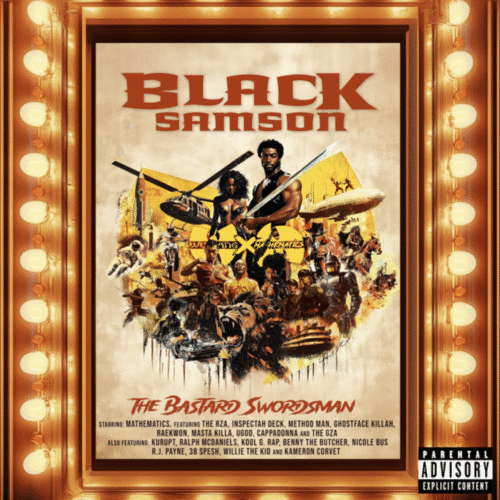Wu-Tang Clan & Mathematics’ Black Samson, the Bastard Swordsman hits like a cipher from the spirit world—raw, mythic, and soaked in the DNA of Shaolin warriors. Mathematics, the Clan’s secret mixing weapon and DJ for quite some time, steps fully into the chamber here, crafting beats that echo the ghost of ’93 but with sharper blades and deeper shadows. It’s full of nostalgia and spiritual continuity for the Wu-Tang verse. We have verses from RZA, GZA, Method Man, Raekwon, Ghostface Killah, Cappadonna, Inspectah Deck, U-God, Masta Killa, all nine living members of Wu-Tang, the first time since 2015’s Once Upon a Time in Shaolin.
From the jump, “Sucker Free City” cracks open like a lost reel from “The Mystery of Chessboxing.” Kurupt rides shotgun alongside Wu generals, and the energy is uncut. The kicks snap. The snares crackle like firewood in a dojo. “Mandingo” is pure sword-style rap: Raekwon and Deck spit bars like they’re engraving commandments in concrete, with Method Man smoothing it out like silk on steel. It sounds like old school Wu.
But it’s “Claudine” that re-centres the soul of the album, having Ghostface Killah mourning his mother over a sombre soul sample and Nicole Bus singing like she’s channelling the gods. It’s not just a song. You feel it in your chest.
What’s wild is how cinematic it all feels—”Cleopatra Jones” and “Warriors Two, Cooley High” are named like old-school VHS joints, and they play that way. Grainy, grimy, full of swagger and slow-motion walkaways. Benny the Butcher showing up is no gimmick—it’s a passing of torches between eras of rawness.
Black Samson is more than a throwback—it’s a reckoning continuing the saga. Wu-Tang doesn’t need to reinvent itself as its blueprint still holds. It’s boom bap for the apocalypse, spit with the wisdom of men who’ve seen kingdoms rise and fall. The Bastard Swordsman swings.
























